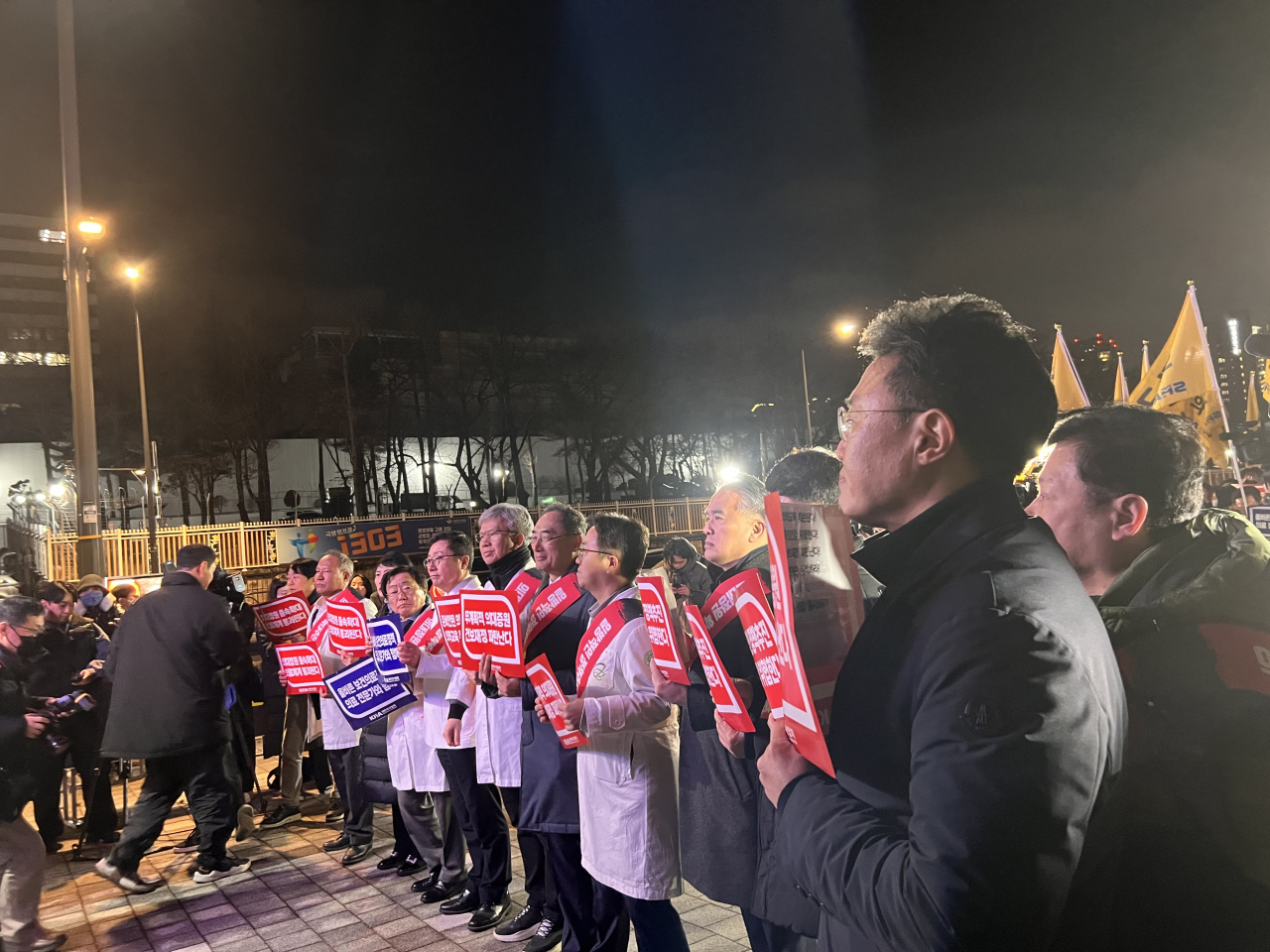[From the Scene] ‘South Korea’s health care died on Feb. 6’
Seoul doctors hold 1st rally in front of presidential office, denouncing new health care policy as ploy for quota expansion
By Park Jun-heePublished : Feb. 16, 2024 - 13:31

Unleashing pent-up anger against the government’s decision to increase the medical school enrollment quota by 2,000 from the current 3,058, hundreds of doctors from the Seoul Medical Association, along with medical students, interns and residents and their families, walked the picket line on Thursday to urge a reversal of the planned hike.
The picket was part of massive protests staged by doctors’ groups nationwide beginning Tuesday, marking the first collective action by doctors groups since the Korean Medical Association -- the country’s largest coalition of doctors’ groups with some 130,000 members -- went into emergency mode last week.
On the frosty winter evening, around 500 people gathered in front of the War Memorial of Korea in Yongsan, central Seoul, near the presidential office, shouting their grievances and holding red cutouts reading, “Say no to medical school expansion,” in hopes that their voices would be heard.
“Feb. 6 is the day South Korea’s health care was declared dead,” said Kim Taek-woo, who heads the emergency committee of the KMA, referring to the day the South Korean government made its announcement.
“(The doctors) have requested the government to salvage shortage sectors and prevent doctors treating serious patients from leaving their profession. But what comes back is placing a rotten carrot on the menu named the ‘essential health care policy package.’ It’s akin to asking us if we’ll accept 2,000 more doctors in exchange for the rotten carrot,” Kim shouted as he raised his fist.
Kim also expressed concerns about the severe brain drain in science and engineering departments, with many expected to pursue medical professions in line with the government expanding the enrollment quota. He lambasted Health Minister Cho Kyoo-hong for saying the medical school obsession will continue “only for now.”
“Deans of engineering departments have said that the South Korean engineering field is collapsing following the news that the country will have more doctors,” Kim said.
Clad in his white coat, Park Myung-ha, president of the SMA, added that the government’s crackdown will only increase the medical circle’s “will to fight.”
“Students at each medical school are creating task force teams and declaring to leave campus en masse. The Korean Intern Resident Association has also made its transition into an emergency leadership system, and a growing number of residents are deciding not to renew their contracts.”
Joining the rally, a junior doctor at Wonkwang Hospital countered criticism of the doctors putting their own interests over patient care, saying she is responsible for protecting herself first.
A total of 126 trainee doctors under 22 departments at Wonkwang University Hospital officially tendered their resignation letters late Thursday, saying they would continue their training only until March 15. The hospital said it would determine whether to accept the resignations.
In addition, representatives from 35 medical schools out of the 40 colleges nationwide held an emergency meeting the same day and voted that medical students should apply for leaves of absence en masse on Tuesday, according to reports citing health and educational authorities.
On Friday morning, a group of trainee doctors said residents and interns at Seoul's top five hospitals have decided to tender their resignations en masse and stop working at the hospitals after 6 a.m. Tuesday. The five hospitals are Seoul National University Hospital, Severance Hospital, Samsung Medical Center, Asan Medical Center and the Catholic University of Korea Seoul St. Mary’s Hospital.
The government, meanwhile, reiterated its earlier stance of zero tolerance, stating it would exercise administrative orders to enforce a return to work and strip licenses if obedience is not observed.
The emergency body of the KMA will hold its first meeting Saturday to lay out its specific plans for collective action.





![[Weekender] How DDP emerged as an icon of Seoul](http://res.heraldm.com/phpwas/restmb_idxmake.php?idx=644&simg=/content/image/2024/04/25/20240425050915_0.jpg&u=)



![[Music in drama] An ode to childhood trauma](http://res.heraldm.com/phpwas/restmb_idxmake.php?idx=644&simg=/content/image/2024/04/25/20240425050929_0.jpg&u=)








![[Herald Interview] Mistakes turn into blessings in street performance, director says](http://res.heraldm.com/phpwas/restmb_idxmake.php?idx=652&simg=/content/image/2024/04/28/20240428050150_0.jpg&u=20240428174656)
